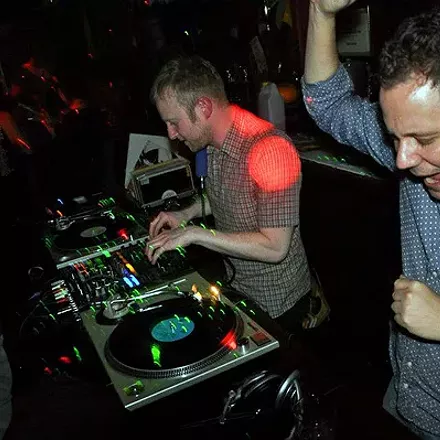Horrific as it may be, Chris Palko’s
past deserves to be discussed. Born
in Germany to an American military
police officer who would be dishonorably
discharged for dealing drugs, Palko’s early
troubles involved being forced to tie tourniquets
around his father’s arm while he
injected heroin. His father left his life by
age 8; as Palko progressed into his teens,
he, too, began consuming intoxicants (alcohol,
marijuana and LSD, among others) and
frequently clashed with the law. Entering
a mental hospital as an alternative to jail
time, his year-and-a-half-long tenure led
to many disturbing turns: The nadir was
suicide attempts after being a guinea pig
for Prozac. When he was released at 18,
Palko entered hip-hop and took on a new
moniker: Cage.
Cage’s first full-length salvos—2002’s
Movies for the Blind and 2005’s Hell’s Winter—display his existence with a stark, unrelenting
grit. Framing his work, Palko says,
“Movies was about the exaggerated psychoses.
Hell’s Winter was going back and touching
on that but also talking about wanting to
get my shit together.” While Hell’s spilled violent
imagery (including a visceral ketamine-induced
car crash), Movies was particularly
perverse, containing lines like “Girls want
dick not words” (“Teenage Death”) and
“Fucked the first two bitches like dogs and
I jacked off on the third” (“Agent Orange”).
Palko now disowns that album’s material:
“If people like that type of music, hey, there
are a hundred kids making that same fucking
song over and over again,” he says.
“It’s boring. It’s not challenging.” Much of
that stems from realizing a recently found
responsibility to his daughter: “She’s older
and she can understand,” he says in reference
to the sexualized savagery he presented
on Movies. “The last thing I want to do is
be explaining that to her. ‘Why is my father
this fucking monster?’”
July 7’s Depart From Me mines his experiences
during the creation of and after
Hell’s. “There was all that shit going on. The
approach is like coping and trying to pull
myself out of it. The music was a distraction
in that sense that I was not jumping in front
of a bus.” Like the rest of his work, Depart
is neither friendly nor easily digestible.
While sometimes sonorous, his third disc’s
distorted backing beats are designed to
remain second to his deep, confrontational
snarl. His flow is prone to staggering and
rambling and, in tackling weight problems,
infatuation and loss, his bluntness remains
a blessing. “I didn’t edit anything out. I was
a father when I made Movies for the Blind,
too, but I was on copious amounts of drugs.
The only thing that’s changed that I’m not
on drugs. I’m aware now.”
While gradual and natural, his evolution
in both lyrical content and fashion sense (late
’90s gangsta wear to sweeping bangs and
plaid shirts) has been polarizing. Palko cites
YouTube comments for Depart single “I Never
Knew You” as a hotspot for vitriol (alongside
compliments, responses include “When did
Cage turn all emo? This song is a fag” and “no
agent orange this is more like agent magenta”
[sic]). “I’m flattered that there are thousands
of people walking around bummed the
fuck out and even ferociously pissed off that
I don’t make that kind of music anymore,” he
remarks. “That I could have touched someone
to that point that I filled them with rage—pssht, I never thought in a million years I’d
achieve that.” In short: “I’m happier with
people hating me than loving me.”
His work-in-progress redemption shows
positivity and promise. More may know his
story soon: Friend and long-time listener
Shia LeBeouf is working on a screen adaptation
of Cage’s life and hopes to play the
lead, calling the part his “Jake LaMotta,”
referencing Robert De Niro’s Raging Bull
persona. In that growth from abject delinquent
to self-aware artist, Cage’s scope
has changed, too. “I’m not trying to make
music for the minority. I don’t want to
make music for a hundred kids. I want to
just make music and let anyone who wants
to listen to it listen to it.”
CAGE
The Urban Lounge
241 S 500 East
Saturday, July 11
9 p.m.
24Tix.com
Speaking of...
-
C Street Studios
A chat with the director behind the independent filming company.
- May 15, 2017
-
Faultline Film Awards
Previewing the signups and awards showcase happening at the U.
- Jan 29, 2017
-
Long Way North
A chat with Rémi Chayé about his directorial debut.
- Nov 18, 2016
- More »
More by Reyan Ali
-
Satan's Satyrs
Metal/garage-rock purveyors Satan's Satyrs dream big
- Apr 8, 2015
-
Enslaved
Chameleonic metal outfit Enslaved prove the lasting power of teenage kicks
- Mar 11, 2015
-
Doomtree
For Mike Mictlan and indie hip-hop outfit Doomtree, all together means going all in
- Mar 4, 2015
- More »
Latest in Music
Readers also liked…
-
The Alpines Head North
Local band's debut concept album finds musical bliss in the apocalypse.
- Feb 7, 2024









